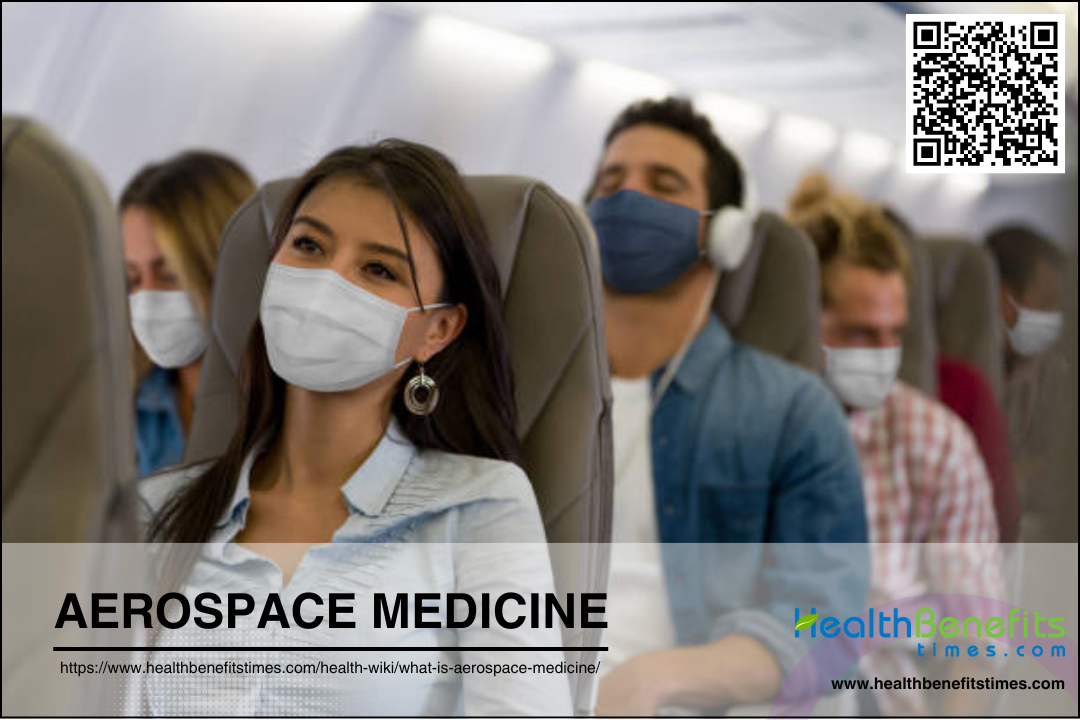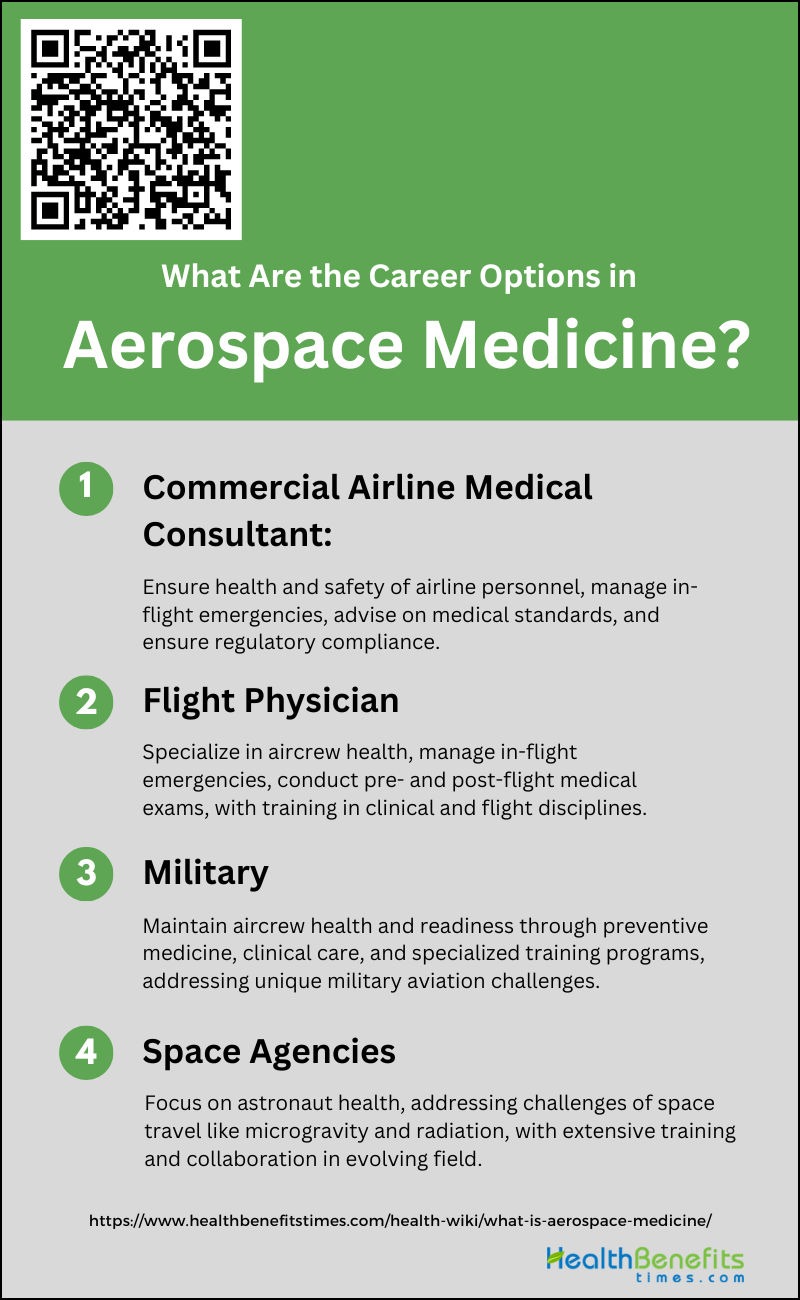Aerospace medicine is a medical specialty focused on the health and safety of individuals involved in air and space travel, including pilots, aircrew, astronauts, and passengers. It deals with the physiological and psychological challenges posed by the unique environments encountered during flight, such as changes in atmospheric pressure, radiation exposure, microgravity, and extreme forces like acceleration and deceleration. Aerospace medicine aims to prevent and manage adverse health effects associated with these conditions, ensuring optimal human performance and safety in aviation and space exploration endeavors. This involves activities like establishing medical standards for flight personnel, providing in-flight medical monitoring and support, conducting research on the impacts of aerospace environments, and developing protective equipment and countermeasures.
Scope of Aerospace Medicine
It covers various factors like altitude, radiation, motion, extreme temperatures, and weightlessness. This field is crucial due to the large number of people traveling by air and the increasing number of countries involved in space exploration. Aerospace medicine includes sub-disciplines like aircrew health care, cardiovascular and pulmonary medicine, and the study of human factors in aerospace environments. It also contributes to areas like patient transport systems, monitoring technologies, and safety protocols. Additionally, it plays a significant role in education and research to meet the demands of commercial spaceflight and NASA operations. As aerospace activities expand, the importance of aerospace medicine in ensuring the well-being and performance of individuals involved will continue to grow.
Aerospace Medical Certification and Standards
The Aerospace Medical Association suggests that the current Federal Aviation Administration (FAA) Class I medical standards are suitable for pilots of commercial suborbital flights. However, additional medical examinations like ECG and hemoglobin A1c tests are recommended. For general-use aerospace transportation vehicles, medical criteria should be established for occupant selection, vehicle design, and operational guidelines to improve mission success and minimize risks. The international standardization of medical certification for civil aircrew is complex due to different healthcare priorities and aviation roles across nations. Nevertheless, the International Civil Aviation Organization (ICAO) plays a crucial role in achieving consensus on these standards. Furthermore, the development of medical standards for unmanned aircraft system (UAS) pilots emphasizes the need for tailored criteria that address the unique demands of ground control station environments. The contributions of Louis H. Bauer, M.D., highlight the evolution and ongoing refinement of civil aviation medical standards to adapt to technological advancements and changing operational requirements.
What Are the Career Options in Aerospace Medicine?
Below is a list of career options available in the dynamic and evolving field of aerospace medicine.
1. Commercial Airline Medical Consultant
Commercial airline medical consultants play a crucial role in ensuring the health and safety of airline pilots and passengers. These professionals are responsible for advising airline management on medical standards and practices, conducting health assessments, and managing in-flight medical emergencies. They work closely with regulatory bodies to ensure compliance with aviation medical standards and often collaborate with specialists in cardiology, neurology, and other fields to address specific health concerns of pilots. The role has evolved significantly since the late 1960s, with consultants now being integral to maintaining the operational readiness and safety of airline personnel.
2. Flight Physician
Flight physicians, also known as flight surgeons in the military context, are medical officers who specialize in the health and performance of aircrew and passengers. They are trained to handle the unique challenges posed by the aviation environment, such as changes in pressure, spatial disorientation, and microgravity. Their responsibilities include conducting pre-flight medical examinations, managing in-flight medical emergencies, and providing post-flight medical care. Flight physicians undergo rigorous training, including clinical rotations and flight training, to prepare for their roles. They are essential in both military and civilian aviation sectors, ensuring the safety and well-being of those who travel by air.
3. Military
In the military, aerospace medicine specialists are vital for maintaining the health and operational readiness of aircrew. These professionals are involved in preventive medicine, clinical care, and research to address the unique medical challenges faced by military aviators. They undergo specialized training programs, such as those offered by the U.S. Air Force and Navy, which include flight training and rotations in various medical disciplines. Military aerospace medicine also involves the use of specific medications and protocols to enhance performance and safety during sustained operations. The field continues to evolve with advancements in technology and the increasing complexity of military aviation.
4. Space Agencies
These professionals address the physiological and psychological challenges of space travel, such as microgravity, radiation exposure, and isolation. They are involved in pre-mission health assessments, in-mission medical support, and post-mission rehabilitation. Training for these roles is extensive, often involving collaboration with academic institutions and participation in specialized programs. As commercial spaceflight becomes more prevalent, the demand for aerospace medicine specialists in space agencies is expected to grow, highlighting the need for continuous advancements in this field.



